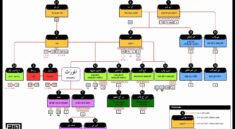Credit Purchase Requirements (Continued)
Continuing the previous discussion related to the terms of buying and selling credit, still on the conditions related to ‘Iwadh’ (value and goods).
Third Provisions: There may be no additional in debt set for the buyer
The point is when the credit is still nominal, then there is no more nominal additional or benefits. Surely this is a basic requirement in buying and selling credit. Determine that has been set must not increase over time.
There is history based on the Prophet sallallaahu ‘alaihi wa sallam,
Every loan has been made with interest, so that is God
“Every debt that brings benefits is usury.”
The hadith above is the lafaz Dha’if. It is narrated in other words,
That the Prophet – may God’s prayers and peace be on it – forbid valuable loans
“That the Prophet sallallaahu ‘alaihi wa sallam forbade the debt that brought profits.” (Told by Al-Harits bin Abi Usamah, at Musnad-that, and in this hadith there is a narrator Matrab. As said Al-Hafizh Ibn Hajar In At-talkhis al-Habirir, 3: 34)
Imam Al-Baihaqi tells another pronunciation at Name-Him, he,
Every loan has been made, and that is the face of God
“Every debt that brings profits, then it is included among the parts of the usury.” (Al-Bihaqi says: Mauquf And this hadith is assessed Dha’if by Ibn Hajar al-Asqalani and also Sheikh al-Albani Galil Irraul 5: 235) [1]
Most words that describe the additional benefits of debt are the tube is the pronunciation Dha’if (weak), but the meaning is true and this is in accordance with the agreement of the scholars. Sheikh bin Baz Rahimahullah In his fat, he stated that. He said,
The hadith mentioned above is weak among scholars, that is not true, but the meaning is true for scholars, meaning: loans that drag the benefits are prohibited by round sounds
“The hadith mentioned is actually a weak hadith according to the statement of science experts, the hadith is not a valid hadith. But in meaning, the hadith is the true meaning according to the statements of the scholars. Namely, debts that bring benefits, then forbidden according to the agreement (the scholars).” [2]
But Sheikh Muhammad bin Salih al-Utsaimin Rahimahullah After mentioning the hadith above he said,
It is a weak hadith, but it means true
“However, the hadith is a dha’if (weak) but valid hadith.” [3]
To from Nash-Nash Or the rules above, it can be seen that what is used as the main benchmark in this case is the existence of “additional”. Questions arise, “Is every addition in the debt of receivables is usury and is not allowed?”
The answer is this depends on the addition. At least additional in debt is generally divided into two conditions:
First, the additions occurred when the credit agreement took place
From the first situation this is divided into several types,
- Profitable debtor supplement As a condition When the contract will take place.
For example, A gives debt to B of one hundred million rupiah. With conditions, B gives his car to be used by A for one year. So, this kind of condition is not allowed. Because conditions like this are vanity conditions. Prophet sallallaahu ‘alaihi wa sallam say,
Muslims are in their part except a condition that is more forbidden or prohibited
“Muslims are bound by their provisions (agreements), except for conditions that legalize something illegal or forbid something valid. “ (Hours. Bukhari)
Additional in the debt contract of receivables has been prohibited. So that if the condition is determined, it is not allowed because these conditions justify the haram cases.
- Additional in the form of late fines, good Conditional or not.
B owed A, then A gave a condition for late fines if B was not on time in paying his debt every month. This happens a lot in buying and selling credit, and of course this is a tyranny.
Majma ‘Al-Fiqhi Al-Slaamiy was once asked about the delay in debt, and answered,
If the credit is a condition on the debtor or imposed on HIM to pay a Sum of Money for Him a Specific Criminal Fine or a certain percentage if he is late to pay on the date specified between them, then it is a condition or a false imposition and Permissible, whether the part of the bank is the bank or others because this is the same as the usury of the pre -islamic who descended the Qur’an with its prohibition
“In fact, if a creditor (lender) requires a debtor (borrower) or charges him to pay a certain amount of money as a certain fine or with certain items if he is late paying at the agreed time between the two, then these conditions or loading are vanity (invalid) and not mandatory to be fulfilled, even not halal. Both what requires it is a bank or other party, because this is usury jahiliyah who is exactly the same as the forbidden by the Qur’an. ” [4]
- Advising additional additions to debtors unconditional At the beginning of the contract, but occurs when the contract is ongoing.
For example, B owes A, without any conditions. But after time running, A asked B to add a few percent of his debt. Obviously this is not allowed, even this is more wrong than the addition of the condition at the beginning of the contract.
- Profitable additional debt unconditional At the beginning of the agreement.
Sheikh Muhammad bin Salih Al-Utssaimin Rahimahullah He activated this and he gave the following examples,
A has the land he has planted. Then, B (farmers/cultivators) came to A and said, “I now do not have livestock to plow the land.”
So, A said to B, “I will borrow you (money) to buy livestock so you can hijack the land.”
In this case, There are benefits for lenders (a) Because the land will now be worked on and produce a harvest, and he will get his agreed part with a cultivator (B).
But this is done without annexThen good intentions here Not only for lenders, but for both (land owners and farmers). The lender gets the benefits of the land that is worked on, and the borrower (farmers) benefit from the crop results. So, this Law can (Allowed but not required). Because of some cases,
[1] Because the benefits of additional additional not pure for debt givers;
[2] In the above agreement there are benefits for both parties (debtors and debtors);
[3] Addition is not used as a condition (initially). [5]
Second, the additional that occurs when the credit agreement is complete (without any conditions at the beginning of the contract)
The point is when someone is in debt or buying and selling credit, then he wants to exaggerate the nominal of the debt, then this is allowed. Of course, with the condition “there are no additional conditions at the beginning of the contract”; And after the contract is complete or the debt is paid off.
Example of the picture:
A owed B to buy a car for one hundred million. A Install to B for ten months with a nominal of ten million each month. The last month was left, A wanted to pay his last installment of ten million. However, A took the initiative to exaggerate its nominal for B to eleven million rupiah.
Then this is allowed, because B does not require the addition of the addition at the beginning of the contract and the installments are paid off.
Another example:
A borrowed B for one hundred million. After paying off the payment, A lent his car to B for one week as a form of good B who has lent A money. Even this is allowed.
This is based on the hadith of the Prophet sallallaahu ‘alaihi wa sallam,
That the messenger of God, hopefully God’s prayers and peace are on him, corresponded to a virgin man, so I came to him camels from charity, so Abu Rafeh ordered that the person spent his hatred, so Abu Rafeh returned to him and said: I only found the choice of Quadruple in it, so he said: give him the best of them,
“The messenger of God (may peace surrender it) borrowed a young camel from a man. Then came the camel zakat to him, he ordered Abu Rafi ‘to pay the camel to the man. So he said,’ Give him. Indeed the best of humans is the best in paying (debt).‘”(Jam. Muslim)
The point is that the debt payments are exaggerated. So it does not matter if you want to give additional debtors in the form of prizes or others, of course when the credit agreement has been completed and there are no these conditions at the beginning of the contract.
In essence, in general there should not be additional in buying and selling credit. Considering this includes those forbidden in the Islamic Sharia.
Hope it is useful. Wallahu a’lam.
[Bersambung]
Back to section 6
***
Depok, 15 Zulhijah 1446/10 June 2025
Writer: Zia Abdurrofi
Article Muslim.or.id
Reference:
- Al-Bay’u bit taqsith ahkaamuhu wa a sentauhanu filqil islamiy, Dr. Abdunnur Farih Ali.
- Ahit Auqa Ali-Thelms, Abdullah bin Radhiy’s job
- Sheikh bin Baz website Rahimahullah.
- Syarhul Mumty ‘Alaa Zadil Mustaqni’, The work of Sheikh Muhammad bin Salih al-Utsaimin Rahimahullah.
- Fiqhul ma’amalat.
- Fiqhut rich al-Muslim, Husaamuddin bin Moses work.
- And some other references.
Footnote:
[1] Rich Al-Muslim Fiqhut Book, matter. 129.
[2] See https://binbaz.org.sa/fatwas/11039/
[3] Syarhul Mumty ” Ala Zadil’s Mustaqni ‘, 9: 109.
[4] Fiqhul mu’7alath, 3: 391.
[5] Syarhul Mumty ” Ala Zadil’s Mustaqni ‘, 9: 109.
Game Center
Game News
Review Film
Rumus Matematika
Anime Batch
Berita Terkini
Berita Terkini
Berita Terkini
Berita Terkini
review anime



